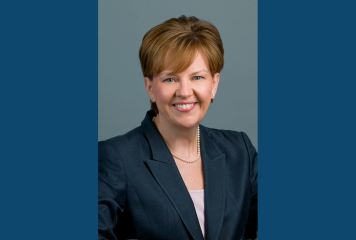Highlighting the Accomplishments of Marianne M. Green, MD, Chair, ABIM Board of Directors
June 15, 2021 | Posted by ABIM | Uncategorized
In life there are periods of relative calm, and times that require strong leaders to move history forward. The past year has certainly been chaotic – our society has experienced racial unrest and a pandemic that overburdened our health care system, resulting in the deaths of more than 600,000 Americans.
Marianne M. Green, MD, Chair of the Board of Directors, has led ABIM through it all. She was at the helm as the Board considered the role ABIM should play in eliminating racial disparities in health care. She navigated ABIM through an ever-changing health care environment from the early days of COVID through today, always keeping physicians’ best interests at heart and overseeing the Board’s decision to extend Maintenance of Certification (MOC) requirement deadlines twice. With an open mind, a sharp intellect and a ‘listening ear,’ she helped create positive and lasting changes within the organization during a period that will be studied for years to come.
Dr. Green started serving as Chair in July 2019 and will end her term on June 30. Fortunately, she will remain on the Board and will continue to have a voice at ABIM. Dr. Green previously served as Director on the ABIM Council and is a former Chair of the ABIM Internal Medicine Board.
“It has been a privilege to work with Marianne these past two years; she has been a wonderful partner,” said Richard J. Baron, MD, ABIM President and CEO. “Marianne has worked hard to make sure that everyone’s voice was heard. She was not afraid to push forward important topics, and she courageously challenged us while maintaining an aspiration for what might be. Marianne led us through some difficult discussions and continued to inspire all of us. I am very grateful for all she has done for ABIM as its Chair at this extraordinary time.”
Board certified in internal medicine, Dr. Green is Vice Dean for Education at the Northwestern University Feinberg School of Medicine and the Raymond H. Curry MD Professor of Medical Education, and she continues to be active in direct patient care. ABIM has benefitted from her knowledge of medical education and assessments, her leadership skills, and her grounded understanding of the world of internal medicine as it actually is today.
“When I think about Marianne’s leadership over the past year, the events of March 2020 immediately come to mind,” said Yul D. Ejnes, MD, Chair-elect of the Board. “Not only did ABIM make the decision for its staff to go virtual for day-to-day operations, but at the same time we had to decide how we were going to manage the exams that were scheduled for the spring. We did not have much time to decide. The issues were the safety of our diplomates who were planning to use a test center and our desire to not distract from patient care and personal needs during this stressful time. Marianne led the Board through the decision-making process that considered all of the implications – and there were many more than one would think – before we decided to suspend MOC requirements for 2020. Under Marianne’s leadership, we went through a very similar thoughtful process with respect to the 2021 MOC requirements.”
Under Dr. Green’s direction, ABIM continued outreach to the community to ensure our programs meet the needs of today’s practicing physicians. Discussions with physicians led to the creation of an innovative new assessment for MOC launching in 2022, the Longitudinal Knowledge Assessment (LKA), that provides greater flexibility, more convenience, and faster feedback.
“When I look back on my professional career, my work with ABIM is one of the things I am most proud of. There’s no question about that. Self-regulation is a hallmark of our profession. We need to do it in a way that makes physicians proud to be board certified and see value in the process. ABIM’s changes over the last several years are moving us in that direction,” said Dr. Green. “I’m so grateful to have had a chance to support these efforts.”
Dr. Green led the board with conviction and compassion, always asking good questions, and listening with an open mind, ready to learn.
“Marianne’s style is to tell it like it is, including when she needs more information to make a decision,” said Dr. Ejnes. “Too often, Chairs will do most of the talking, which inhibits discussion, or stay silent, depriving the group of the Chair’s valuable input. Marianne avoided both when leading our discussions by moderating, participating, and not dominating.”
Under Dr. Green’s leadership, ABIM vowed to move from a passive to an active role in the fight against racism in health care and began promoting diversity, equity and inclusion (DEI). Shortly after the death of George Floyd, the ABIM Board of Directors and the ABIM Foundation Board of Trustees released a joint statement pledging to “actively do our part in opposing and dismantling systems and policies that cause harm to our patients and disproportionately affect those in Black and Brown communities.” Not long after that, ABIM reaffirmed transgender rights in health care matters, disputing a Department of Health and Human Services (HHS) decision to eliminate provisions of a 2016 rule that allow discrimination on the basis of gender identity.
Dr. Green led some difficult discussions on these topics with acceptance of different viewpoints, but an unwavering focus on the issues that needed to be addressed.
“Marianne did an incredible job,” said Board Member Sonia Madison. “It’s just been a privilege to work under her leadership, because to me, she represents what a true leader is: someone who has strength and courage and is direct, but also is open and showing others that they also have a voice and a point of view to share.”
Most recently, the Board approved two resolutions addressing health equity and the need for questions about DEI to be included on all ABIM exams, a decision that will help physicians learn about racism in health care and help remove structural barriers to health care for Black and Brown individuals.
“We cannot ignore the structural racism that has resulted in significant health disparities,” said Dr. Green. “Every organization in this country has a role to play in the dismantling of unequal systems and ABIM is no exception. I am proud of the work that ABIM has initiated to address these issues. The road to true change is a long one, but one that is critical to navigate effectively and with commitment.”
Dr. Ejnes, will become Chair on July 1, 2021. He is in private practice at Coastal Medical, Inc. in Cranston, Rhode Island, which he founded in 1995. Coastal Medical is Rhode Island’s largest private practice, a Level 3 Patient Centered Medical Home, and a Medicare accountable care organization. In addition to practicing full-time, Dr. Ejnes is Clinical Associate Professor of Medicine at the Warren Alpert Medical School of Brown University, and a former Chair of the Board of Regents of the American College of Physicians.
He believes ABIM’s biggest challenges will center on how the “environment in which our diplomates practice continues to evolve, perhaps even accelerated by the pandemic. We need to reassess our programs continuously to make sure they are as relevant, valuable, and meaningful as possible in light of the changes.”
He cites the LKA as a good example of how ABIM has worked with physicians to create an assessment option that works for them. His goals include “helping ABIM succeed in the projects already under way, such as the Longitudinal Knowledge Assessment and the work in diversity, equity, and inclusion. Another is to continue ABIM’s diplomate-centered approach. We are a mission-driven organization that serves patients and the profession, but in order to succeed, we need our physicians on board. That is a value instilled by our CEO, Dr. Baron, and it is one that I share. Related to that goal is my commitment to improving our relationships with our partners in that diplomate-centered approach – the professional societies and others who support our diplomates.”



